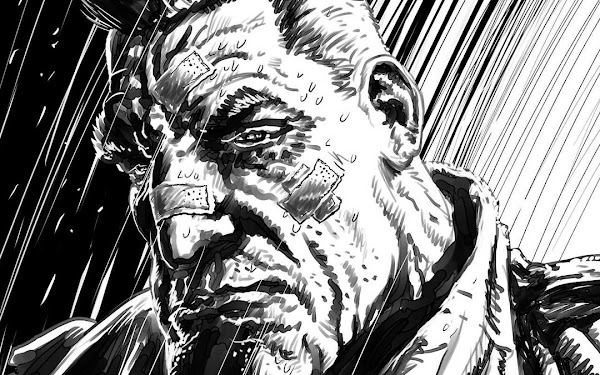Angela, alienation, Avengers, anime and the alt-right
I recently got into an online argument on social media with David Armstrong (Catholic blogger at Pop Culture & Theology) that wound up going full-length on his blog Perennial Digression. This happened because I made a post (consciously and ironically referencing Futurama) to the effect that ‘superhero movies are bad and you should feel bad’. This post ended up sprawling out in all sorts of directions that, given the nature of my friends group, wound up going off in eddies around high Christology and Church history. But the actual root of my original complaint against superhero movies and comic book culture in general was not in fact Christological (until Armstrong himself made it so, by suggesting that by disliking superhero movies I was in danger of apostasy from Christendom by rejecting messianism tout court). I was in fact motivated by certain broader cultural concerns that I have been thinking about for some time.
My one major complaint against the Marvel movies specifically is that they are bores. I also recounted my personal anecdote about how I came to an epiphany about how boring MCU movies are after trying to watch Ant-Man on a transpacific flight. It struck me that they basically all told the same story, and that their basic plot beats, on examination, tend to be artificial and emotionally manipulative. This is a complaint that has been vented in particular by veteran film directors Martin Scorsese and Francis Ford Coppola, and most recently by Dune director Denis Villeneuve. Armstrong is free to disagree with me on this, and clearly he does, but I think Scorsese’s, Coppola’s and Villeneuve’s æsthetic complaint against the Marvel franchise has merit.
What’s more, objectively, I don’t think it is intellectually tenable or logically charitable to hold that the fundamental thrust of these men’s æsthetic complaint is somehow elitist or contemptuous of the taste of the masses. Indeed, Scorsese goes out of his way in his op-ed not to belittle or hold in contempt the tastes of the general public: ‘if people are given only one kind of thing and endlessly sold only one kind of thing, of course they’re going to want more of that one kind of thing’. In general, Marvel movies do tend to get better reviews from professional critics and Hollywood insiders than they do from audiences. This suggests to me that ‘demand-side’ audience approval is not primarily what drives or motivates the Mickey Mouse corporate factory’s output.
But I began to think about another line of critique of superhero movies and comic books after having read Kill All Normies by Irish-American sociologist and left-wing culture critic Angela Nagle. This one goes after the other side of the coin: the ‘darker side’ of comic book culture and the superhero mythos.
Now, Nagle’s focus in Kill All Normies is pretty narrow: she is conducting a sociological examination of the various online communities, message boards and social media platforms that gave rise to the phenomena of the ‘alt-right’ and the ‘Tumblr liberal’. She does dig pretty deep into the theory underlying these phenomena, citing in particular Nietzsche, de Sade, Bataille and Baudelaire as the primary go-to thinkers for understanding the iconoclastic, taboo-smashing ‘alt-right’ mindset. However, she does occasionally digress into the æsthetics of the alt-right and Tumblr liberalism, and some rather disturbing continuities immediately present themselves.
She talks in particular about the influence that Alan Moore’s V for Vendetta had on the æsthetics of 4chan – specifically, the Guy Fawkes mask that was adopted as the symbol of Anonymous. She talks about how the ‘Dark Age of Comic Books’ (of which Alan Moore’s Watchmen and Frank Miller’s Sin City and The Dark Knight Returns continue to be the lodestones) was the primary driver for the æsthetic sensibilities of the online subculture. First-person shooter games, as well as ‘transgressive’ films from the tail-end of this same era (like Fight Club, American Psycho and The Matrix) were also influential. One of 4chan’s main staples in its early days was sharing not only mainstream anime but also extreme hentai (Japanese animated porn) and sexually-graphic JRPGs and ‘visual novels’. This environment proved to be a breeding-ground for peculiarly violent forms of misogyny (and misanthropy generally) as well as ‘transgressive’ norm-breaking around taboos about sex, suicide and race relations. (I will add here my caveat: I understand quite well that Alan Moore’s and, to a lesser extent, Frank Miller’s works were meant to criticise and subvert, rather than lionise, a certain image of the superhero. I also fully understand that Bateman and Durden are not the heroes in the works that they represent, either. Unfortunately, however, latter interpretations do often supercede original intent.)
Nagle’s argument is that the ethos of anarchic online spaces like 4chan was shaped by a valorisation of the alienated loner, the hacker-as-hero, the absolute freedom from sexual and moral inhibitions offered by masked anonymity. In short: Miller’s version of Bruce Wayne, Tyler Durden, Neo, Marv, Patrick Bateman. Watchmen and The Dark Knight Returns offered a vision of superheroism freed from the constraints of morality that made direct reference to the philosophy of Nietzsche. (Note the crossovers, direct borrowings and thematic fixations between cyberpunk and the ‘transgressive’ genre that characterised comic-book culture and film culture in the late 1980s and 1990s.)
On the other hand, Nagle points to fandom spaces like Tumblr as being the places where the type of behaviour rewarded was image-centred, narcissistic and obsessed with being seen as virtuous. The dominant cultural and æsthetic signifier of Tumblr was, in Nagle’s understanding, the ‘otherkin’: the idea of identifying as ‘mythical creatures, creatures from fantasy or popular culture including “angels, demons, dragons, elves, fairies, sprites, aliens and cartoon characters”’. Tumblr allowed specifically for such performances-as-Other (some more ironic, some less so) and thus created an atmosphere where the unreal and the real merged into a fluid spectrum. Whereas 4chan’s charm was in its users not being seen and thus experiencing the freedom to be an ‘Anonymous’ sociopath, Tumblr’s appeal was in offering its users maximum visibility and thus creating a playground for narcissism. The tendency on Tumblr was to create competitive performances of virtue by aligning with various oppressed or minority identities, and from this competitive performance-based subculture the ‘call-out’ emerged as the weapon of choice. When someone or something is on a pedestal, the instinct to knock it down often proves irresistible.
Here I think I need to stress that anime, comic book culture and superhero movies are incidental influences on the online subcultures that Nagle is illustrating in her attempt at crafting a genealogy of Anglosphere politics in our postmodern, postmoral turn. They are by no means the centre of her attention: she is more interested in 4chan and Tumblr themselves as objects of sociological study than she is necessarily in the elements of the founding mythos of each. At the same time, she can’t really ignore them. Both the ‘alienated loner’ and the ‘otherkin’ archetypes draw from many of the same sources in popular culture. Both shield themselves beneath layers of irony, while at the same time deliberately blurring distinctions between fantasy and mundane, online and real-world. Both draw on the sexual-revolutionary subcultures of the 60s as well (something Nagle explores in an intriguingly and self-avowedly Laschian way), and turn against the idea of procreative sexuality in favour of a sexuality of ‘sovereignty’, ‘dominance’, ‘liberation’ – usually in the mode of de Sade.
Bringing all of this back around to Armstrong’s take on Marvel. He points to the bright side of superhero movies and comic books, fantasy and sci-fi, as reference points to classical virtues and classical heroism in a disenchanted universe that can be leveraged to help modern people make sense of who Christ is. To be sure, he makes a solid and stirring case for it. And – come on – given that I blog here primarily about fantasy and science fiction in Japanese and Russian animation, I am actually quite sympathetic to that case. But I am less sanguine that we can any longer ignore how the Nietzschean ‘fetish for physical male strength, hierarchy and the exertion of will’, which is already knowingly present in the earliest renditions of Superman, has impacted us psychologically. The idea that the ‘alienated loner’ can, through force of will, transcend morality and achieve a sort of dark ‘theonomy’ through acts of gratuitous desecration or destruction was already foreshadowed in Dostoevsky’s Crime and Punishment. (It is worthy of note that the axe murderer Raskol’nikov of this novel is saved only through confession and repentance.) However, in our modern time we have disturbed young men like David Michael Kalac, Anders Behring Breivik and Elliot Rodger, who – far from being reviled for their acts – are in some dark corners of the Internet feted and worshipped for them.
Can we blame that on comic books or DC movies? That would appear to court the same derision as the assertion that violent video games were responsible for the Columbine shootings. And honestly, I don’t think positing a direct causal correlation between the two is either useful or helpful. But they are part of the atmosphere. And, to push back somewhat against Armstrong on this, I don’t think that merely saying ‘taste is taste’ and failing to inquire into what is actually being said by our entertainment will cut it. Without seriously questioning the nature and aims of the heroism on display at the cinema, we do risk falling into certain atavistic theological traps.








Comments
Post a Comment